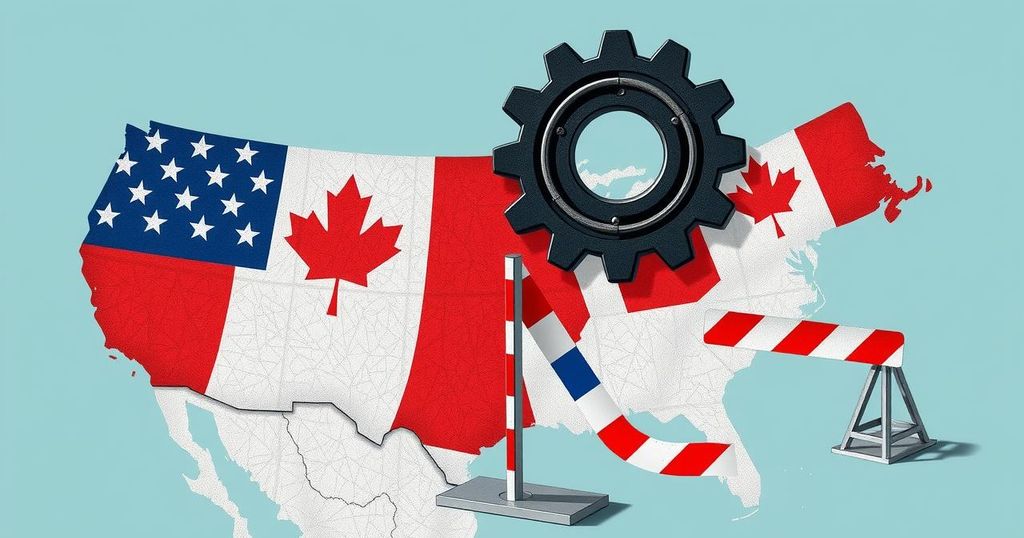World news
AMERICA, AP, ASIA, CANADA, CHINA, CUBA, DONALD TRUMP, ELECTION, FLA, FLORIDA, KI, KIRSTEN HILLMAN, KRIS, KRISTI NOEM, MEXICO, NATIONAL SECURITY, NORTH AMERICA, PALM BEACH, PHILIPPINES, TRUMP, TRUMP ADMINISTRATION, U. S, U.S. ELECTIONS, UNITED STATES, US PRESIDENTIAL ELECTION
Fatima Khan
0 Comments
Trump’s Tariffs May Trigger Economic Pain for Americans
President Trump announced tariffs on Canada, Mexico, and China, cautioning that Americans might face economic repercussions. Canada and Mexico retaliated with their own tariffs, igniting fears of a trade war and raising inflation concerns. This situation could politically pressure Trump as the tariffs may lead to significant losses for American households, undermining his economic promises.
President Donald Trump stated that his tariffs against Canada, Mexico, and China might inflict “some pain” on Americans as the trade war escalates. He claimed Canada would be unable to survive without its favorable trade balance with the U.S., while his administration’s actions have incited concerns about a potential disruption of the North American trade relationship and strained relations with China.
Canada’s U.S. ambassador expressed confusion over the situation, emphasizing the strong ties between the two nations. Trump’s tariffs, imposed under an economic emergency justification, included a 25% penalty on Canadian goods and a 10% tax on energy exports. In response, Canada announced retaliatory tariffs covering a wide range of American products, including alcohol and automobiles.
Trump’s rhetoric criticized Canada, asserting that the U.S. does not require Canadian resources. However, about 25% of the U.S. daily oil consumption depends on Canadian supplies. Canadian leaders are calling for increased domestic purchases, while Prime Minister Justin Trudeau noted that Trump’s measures would negatively affect both countries. Mexico’s president also implemented tariffs and emphasized the need for addressing drug addiction within the U.S.
China indicated its intent to protect its economic interests in light of the tariffs, planning to file a lawsuit with the World Trade Organization. The political ramifications of inflation, which Trump once criticized, may lead him to reconsider the tariffs especially as they could harm American consumers and businesses. Economic experts warn that prolonged tariffs could result in significant economic losses for American households.
An analysis from Yale suggests that continued tariffs may lead to a loss of approximately $1,245 in household income this year, equating to over $1.4 trillion in losses over the next decade. Goldman Sachs anticipates that while tariffs will commence as planned, there remains a possibility of a last-minute negotiation due to the looming economic impacts.
The article discusses the significant trade tensions initiated by President Trump’s tariffs on Canada, Mexico, and China. In an effort to fulfill a campaign promise, Trump has implemented tariffs, which could potentially harm American consumers and alter decades-long trade relationships. The international response has been swift, with countries like Canada and Mexico imposing retaliatory measures, and China preparing legal action. The impact on inflation and the American economy also poses a potential political issue for Trump, as economic repercussions from these tariffs could affect voters.
In conclusion, President Trump’s tariffs introduce a complex web of challenges for the American economy and international relations. While aiming to protect American interests, these tariffs are likely to provoke retaliatory actions from neighboring countries and deter the economic balance. Economic analyses indicate significant financial strain could fall on U.S. households, creating a potential liability for Trump’s administration moving forward.
Original Source: www.theintelligencer.net




Post Comment